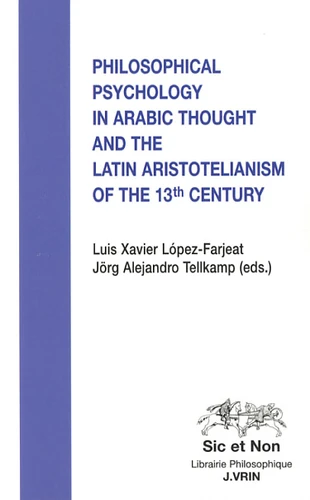Philosophical psychology in arabic thought and the latin aristotelianism of the 13th century
Par : ,Formats :
- Paiement en ligne :
- Livraison à domicile ou en point Mondial Relay entre le 22 juillet et le 25 juilletCet article sera commandé chez un fournisseur et vous sera envoyé 3 à 6 jours après la date de votre commande.
- Retrait Click and Collect en magasin gratuit
- Livraison à domicile ou en point Mondial Relay entre le 22 juillet et le 25 juillet
- Réservation en ligne avec paiement en magasin :
- Indisponible pour réserver et payer en magasin
- Nombre de pages303
- PrésentationBroché
- Poids0.37 kg
- Dimensions13,5 cm × 21,5 cm × 1,8 cm
- ISBN978-2-7116-2461-4
- EAN9782711624614
- Date de parution09/04/2013
- CollectionSic et Non
- ÉditeurVrin
Résumé
In the 13th century many of the Latin doctrines of the soul, intellect and perception were heavily influenced by Arabic sources, being Avicenna and Averroes the most significant ones. Their reading of Aristotle's De anima stresses either a more or less Neoplatonic conceptual framework or a return to the purported Peripatetic roots. This volume deals with the generation and transmission of the Aristotelian science of the soul from Arabic into Latin and, incidentally, into Hebrew.
It becomes clear that Latin discussions, such as in Albert the Great, Thomas Aquinas or Roger Bacon and John Duns Scotus, should be thought of as the result of the either affirmative incorporation and transformation of the Arabic-Aristotelian tradition or its rejection. The articles gathered in this volume showcase various facets of the Arabic and Latin philosophical psychology ranging from the Avicennian theories of vision, cogitation and musical awareness to Averroes's relevance for a proper understanding of Aquinas's early theory of the intellect as well as the structure of animal knowledge according to Albert the Great and Roger Bacon.
Even though rooted in different theological and philosophical traditions, it is clear that the Arabic and Latin theories of the soul use a common Aristotelian language.
It becomes clear that Latin discussions, such as in Albert the Great, Thomas Aquinas or Roger Bacon and John Duns Scotus, should be thought of as the result of the either affirmative incorporation and transformation of the Arabic-Aristotelian tradition or its rejection. The articles gathered in this volume showcase various facets of the Arabic and Latin philosophical psychology ranging from the Avicennian theories of vision, cogitation and musical awareness to Averroes's relevance for a proper understanding of Aquinas's early theory of the intellect as well as the structure of animal knowledge according to Albert the Great and Roger Bacon.
Even though rooted in different theological and philosophical traditions, it is clear that the Arabic and Latin theories of the soul use a common Aristotelian language.
In the 13th century many of the Latin doctrines of the soul, intellect and perception were heavily influenced by Arabic sources, being Avicenna and Averroes the most significant ones. Their reading of Aristotle's De anima stresses either a more or less Neoplatonic conceptual framework or a return to the purported Peripatetic roots. This volume deals with the generation and transmission of the Aristotelian science of the soul from Arabic into Latin and, incidentally, into Hebrew.
It becomes clear that Latin discussions, such as in Albert the Great, Thomas Aquinas or Roger Bacon and John Duns Scotus, should be thought of as the result of the either affirmative incorporation and transformation of the Arabic-Aristotelian tradition or its rejection. The articles gathered in this volume showcase various facets of the Arabic and Latin philosophical psychology ranging from the Avicennian theories of vision, cogitation and musical awareness to Averroes's relevance for a proper understanding of Aquinas's early theory of the intellect as well as the structure of animal knowledge according to Albert the Great and Roger Bacon.
Even though rooted in different theological and philosophical traditions, it is clear that the Arabic and Latin theories of the soul use a common Aristotelian language.
It becomes clear that Latin discussions, such as in Albert the Great, Thomas Aquinas or Roger Bacon and John Duns Scotus, should be thought of as the result of the either affirmative incorporation and transformation of the Arabic-Aristotelian tradition or its rejection. The articles gathered in this volume showcase various facets of the Arabic and Latin philosophical psychology ranging from the Avicennian theories of vision, cogitation and musical awareness to Averroes's relevance for a proper understanding of Aquinas's early theory of the intellect as well as the structure of animal knowledge according to Albert the Great and Roger Bacon.
Even though rooted in different theological and philosophical traditions, it is clear that the Arabic and Latin theories of the soul use a common Aristotelian language.

